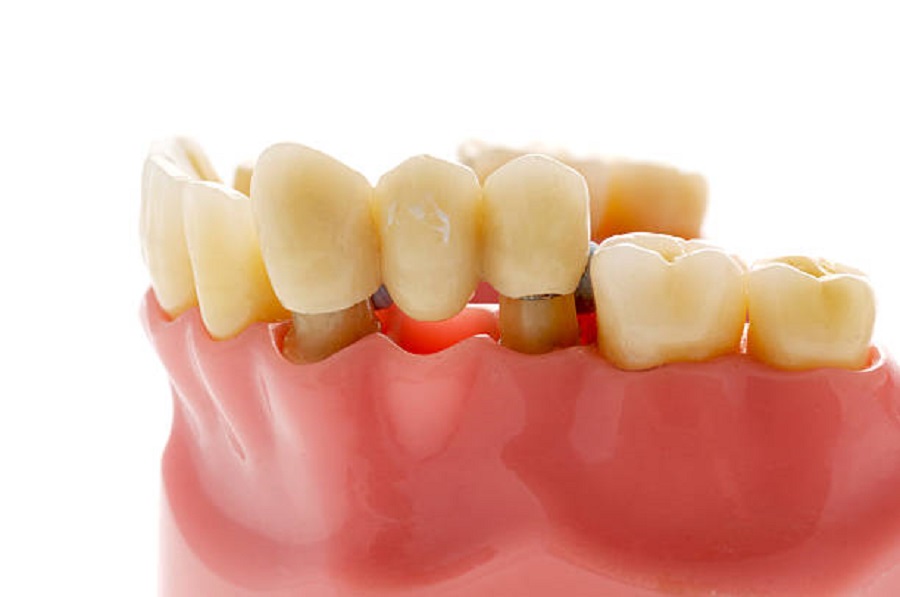How do Dental Crowns & Bridges Help in Oral Functionality?
Maintaining good oral health is not just about having a beautiful smile; it’s also about ensuring proper oral functionality. Dental issues like missing or damaged teeth can significantly impact your ability to speak, chew, and maintain overall oral health. Dental crowns and bridges are two essential restorative dental solutions that play a crucial role in enhancing oral functionality. In this blog, we will explore how dental crowns and bridges help restore and improve oral functionality.
Dental Crowns: Reinforcing Damaged Teeth
A dental crown is a custom-made cap that is placed over a damaged or weakened tooth, restoring its strength, shape, and function. Crowns are often advised in the following scenarios:
Protection for Weakened Teeth:
Teeth that have undergone extensive decay, large fillings, or root canal therapy may become weak and prone to fracture. Dental crowns provide added protection, preventing further damage.
Restoration of Cracked or Broken Teeth:
Teeth that are cracked or broken due to trauma or wear and tear can be restored with dental crowns. The crown holds the tooth together, preventing the crack from worsening.
Covering Severely Discolored or Misshapen Teeth:
Dental crowns can improve the appearance of severely discolored or misshapen teeth, enhancing their aesthetics and function.
Anchor for Dental Bridges:
Crowns are used as anchors for dental bridges, providing stable support for replacing missing teeth.
How Dental Crowns Improve Oral Functionality?
Dental crowns offer several ways in which they enhance oral functionality:
Restoration of Chewing Function:
Damaged or weakened teeth can make it difficult to chew effectively. Dental crowns strengthen these teeth, allowing you to enjoy a wider range of foods and maintain a balanced diet.
Improvement in Speech:
Missing or damaged teeth can affect speech clarity. Dental crowns restore the proper alignment of teeth, improving speech and pronunciation.
Prevention of Further Tooth Wear:
A damaged tooth is more likely to experience additional wear and tear. Dental crowns protect the tooth’s structure, preventing further deterioration and maintaining proper occlusion (bite).
Support for Dental Bridges:
Dental bridges are used to replace missing teeth, and dental crowns serve as abutments (anchors) for the bridge. This allows you to regain your ability to bite and chew comfortably.
Dental Bridges: Bridging the Gap
A dental bridge is a prosthetic device that replaces one or more missing teeth. It consists of one or more artificial teeth (pontics) held in place by dental crowns or other supports on adjacent natural teeth. Dental bridges are recommended for the following scenarios:
Replacing Missing Teeth:
Dental bridges are an effective solution for replacing one or more missing teeth without the need for surgery.
Restoring Oral Function:
Bridges restore the ability to chew and speak properly by filling in the gaps left by missing teeth.
Preventing Teeth Shifting:
When a tooth is lost, neighboring teeth may shift or tilt into the empty space, causing bite problems. Dental bridges prevent this unwanted movement.
How do Dental Bridges Improve Oral Functionality?
Dental bridges offer several advantages in terms of improving oral functionality:
Restored Chewing Ability:
Dental bridges allow you to chew and bite effectively, ensuring you can enjoy a varied diet without limitations.
Enhanced Speech:
Missing teeth can affect your speech, making it difficult to pronounce certain sounds or words. Dental bridges restore your ability to speak clearly.
Maintained Bite Alignment:
By preventing adjacent teeth from shifting into the gap, dental bridges help maintain proper bite alignment, reducing the risk of bite-related issues.
Improved Self-Confidence:
Restoring missing teeth with dental bridges can boost your self-esteem, allowing you to smile and speak with confidence.
Prevention of Jaw Joint Problems:
Missing teeth can lead to temporomandibular joint (TMJ) issues. Dental bridges distribute the force of biting evenly, reducing the risk of TMJ problems.
Dental crowns and bridges play a crucial role in improving oral functionality by restoring damaged or missing teeth. These restorative solutions not only enhance your ability to chew, speak, and maintain proper bite alignment but also contribute to your overall oral health and well-being. If you have damaged or missing teeth, schedule an appointment with your dentist in Castle Hills of Lewisville to determine whether dental crowns, bridges, or a combination of both is the right solution for restoring your smile and oral functionality. With the help of modern dentistry, you can regain your confidence and enjoy a healthy, functional smile for years to come.





 |
|